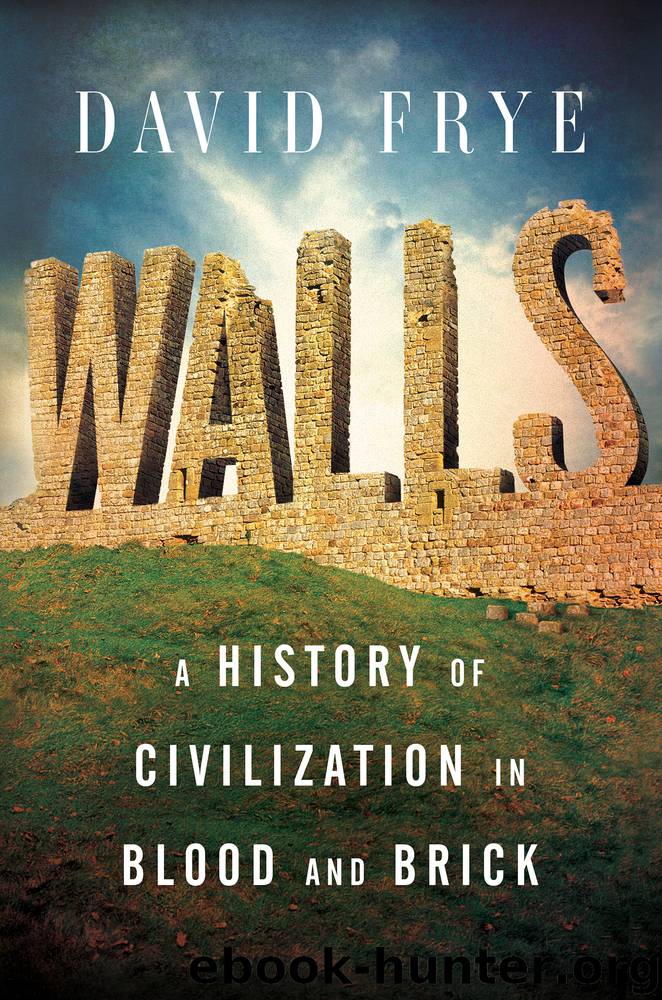Walls by David Frye

Author:David Frye
Language: eng
Format: epub
Publisher: Scribner
PART THREE
* * *
THE WORLD IN TRANSITION
The Horrible Bombard
CONSTANTINOPLE, AD 1453
* * *
Constantine Palaeologus sleeps now. He has joined that select company of heroic monarchs who, like Arthur or Alexander, are supposed to return someday to revive and defend their nations. He is the Marble King, rescued by an angel, turned to stone, and placed beneath the Golden Gate of the walls of Constantinople, where he waits, sleeping, until that day he will awake, take up his sword, and chase the Turks from the city.
The historical Constantine—who ruled as the eleventh Roman or Byzantine emperor by that name—did not have the honor of reviving a nation. He was fated for a very different role, that of doomed hero, in the final defense of Constantinople. Constantine exited the stage only shortly after his entrance, at that moment when the civilized world was finally stripped of the security that had been, for ten thousand years, provided by city walls. For his part in that drama, Constantine was uniquely qualified. Prior to assuming the throne, he had served the Empire as Despot of the Morea, the title then given governors of the Peloponnesus. In that capacity, he had reconstructed the old wall that formerly sealed off the peninsula at the isthmus of Corinth. Despite its unimpressive dimensions, the Corinthian barrier was the grandfather of all European border walls, originally constructed during the Mycenaean era and later rebuilt several times by the Greeks or Romans. Justinian had added towers to it in the sixth century. More recently, Constantine’s own father, the theologically minded Manuel II, had personally overseen repairs. None of these earlier builders had ever faced anything like what came crashing down on Constantine and the wall in 1446: fifty thousand Turkish troops, armed with cannons and catapults. Within weeks, the Turks had broken through, ravaged the Peloponnesus, and forced the future emperor to pay tribute to the Ottoman sultan.
In 1449, Constantine assumed the Byzantine throne, just in time to defend another set of walls against a far larger force. He was forty-three at the time of his coronation, middle-aged and seasoned, stoically prepared to assume his life’s work as defender of a lost cause. He would soon prove himself worthy of ranking with the likes of Leonidas at Thermopylae or Travis at the Alamo, although the empire Constantine was defending was hardly worth the effort. Fifteenth-century Byzantium was a shriveled thing, imperial in name only, having already surrendered most of its territory. The Holy Lands, along with North Africa, had fallen to the initial surge of Islamic armies out of Arabia and been traded back and forth by crusaders, Mongols, and Turks ever since. Asia Minor had held out somewhat longer. It was not lost until the eleventh century, when it fell to the Muslimized former steppe peoples who gave their name to Turkey. The Eastern European provinces, meanwhile, had fallen under the sway of various minor powers. By Constantine’s day, all that remained of the old Empire were some islands, a few Greek cities on the Black Sea coastline, the ravaged Peloponnesus, and Constantinople.
Download
This site does not store any files on its server. We only index and link to content provided by other sites. Please contact the content providers to delete copyright contents if any and email us, we'll remove relevant links or contents immediately.
| Africa | Americas |
| Arctic & Antarctica | Asia |
| Australia & Oceania | Europe |
| Middle East | Russia |
| United States | World |
| Ancient Civilizations | Military |
| Historical Study & Educational Resources |
Cecilia; Or, Memoirs of an Heiress — Volume 1 by Fanny Burney(32549)
Cecilia; Or, Memoirs of an Heiress — Volume 2 by Fanny Burney(31948)
Cecilia; Or, Memoirs of an Heiress — Volume 3 by Fanny Burney(31932)
The Secret History by Donna Tartt(19058)
Sapiens: A Brief History of Humankind by Yuval Noah Harari(14371)
Leonardo da Vinci by Walter Isaacson(13319)
The Radium Girls by Kate Moore(12019)
Sapiens by Yuval Noah Harari(5366)
How Democracies Die by Steven Levitsky & Daniel Ziblatt(5216)
The Wind in My Hair by Masih Alinejad(5092)
Homo Deus: A Brief History of Tomorrow by Yuval Noah Harari(4909)
Endurance: Shackleton's Incredible Voyage by Alfred Lansing(4770)
Man's Search for Meaning by Viktor Frankl(4586)
The Silk Roads by Peter Frankopan(4526)
Millionaire: The Philanderer, Gambler, and Duelist Who Invented Modern Finance by Janet Gleeson(4469)
The Rape of Nanking by Iris Chang(4203)
Joan of Arc by Mary Gordon(4103)
The Motorcycle Diaries by Ernesto Che Guevara(4090)
Stalin by Stephen Kotkin(3958)
